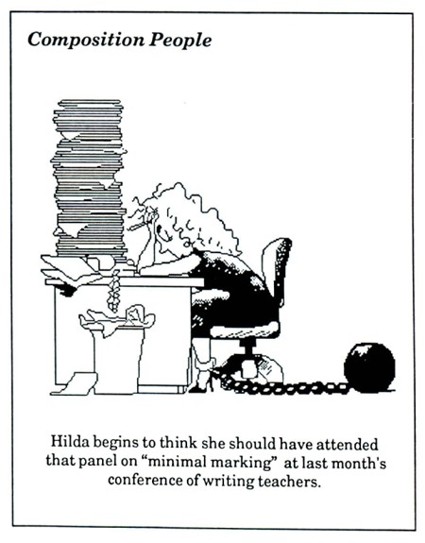Since we returned to work after the February half term, I have spent about 50% of my time preparing for an Ofsted visit. It will be nearly two years since we received our ‘requires improvement’ judgement so we know we are due a visit imminently. Coupled with this, a few schools in our borough have been inspected recently so there are the usual predictions about when we’ll be next.
I am absolutely swamped with work in a way that I haven’t ever experienced in the past 10 years. It is relentless. Every day, there is something new I have been asked to do in the name of Ofsted preparation. This is on top of the usual SLT paperwork that I would be doing. I understand that there is going to be a fair bit of paperwork associated with this job but if I printed out every piece of paper I’ve been given or have produced myself into my special ‘Ofsted’ folder, we’d have no trees left in our borough (which is known as ‘Queen of the Suburbs’ because of its abundance of parks and greenery!)
Every week for the past two months of weekly SLT meetings, we have had an agenda item called ‘Ofsted Preparation’. We have produced documents, questioned each other on our areas, gone over the findings of student interviews, carried out huge work scrutinies, examined new guidance from Ofsted, shared our ‘Ofsted’ folders with each other with myriad data and case studies – these are just the things I can think of off the top of my head. Don’t get me wrong: I am not saying that all of this is worthless but it is certainly overwhelming. Sometimes I ask myself ‘Is it all worth it? Aren’t we scaring ourselves by going overboard like this?’ Yet when I tentatively (well, perhaps not tentatively) voice this opinion, the response is like something from the most zealous boy scout. I think many of our fears stem from the fact that we were, in hindsight, underprepared to face the previous Ofsted inspection. We had lots of data but we didn’t have enough prepared on our gaps and what we were doing about them. This time round, we have so much evidence coming out of our ears that I don’t know when the inspectors are going to get a chance to leave the room and escape our folders!
This week I’ve been thinking about the rest of our staff. If I’m feeling like this, then how on earth is everyone else feeling? At the start of September, we devoted a fair chunk of time to try and reduce teacher workload before it became the buzz phrase of Nicky Morgan a month later. We pinned up countless bits of paper on the head’s board in his office and tried to work out what we could scrap. The horrible truth was that we scrapped very little because nearly every time we tried to scrap something, different people would say ‘But won’t we need to show this for Ofsted?’ And so the little piece of paper stays on the board accompanied with a plaintive murmur ‘It’ll be ok once Ofsted have gone’.
But we’ve been saying that everything will be alright once Ofsted go for far too long; in fact, we’ve said it every week since the start of September and it’s now nearly bloody Easter. How long can we keep saying this? It will come as no surprise to teachers that our biggest workload issue stems from marking and the collection of marking evidence. We were slammed in our last inspection for patchy and ineffective marking. It was a fair cop. Our actual marking policy isn’t too onerous in my opinion. Teachers are asked to identify in advance which pieces of work will be ‘major assessed pieces’. These pieces are assessed, with a WWW comment, subject-specific action and a literacy action. Any other non-assessment pieces of work are either self or peer critiqued, or acknowledged by the teacher but in far less detail. But it’s all the other bits of the marking policy that adds up. Students need time to act upon feedback (fair enough; otherwise, what’s the point?) so teachers need to build in time for student to do this. Yet it’s a blooming miracle if everyone in the class was present the day the assessment was done – don’t even get me started on how many students forget to bring their book so they are clinging onto some crummy piece of paper. Then, when the students have acted upon feedback, which can take anywhere between 15 minutes to 15 hours (or that’s what it can feel like once I’ve found enough green pens) I need to make sure all the key targets and grades are inputted onto these blue assessment tracker sheets so I can see how much wonderful progress my students have made throughout the year.
And who is to blame for this? Well, I am partially culpable. Two years ago, I thought this sounded like a great way of showing Ofsted how well we mark and how we are all so on-track with how students are progressing. Yet assessing students and giving meaningful feedback doesn’t always fit into nice, neat block of times. Departments need some leeway to set their own agenda. If you think your students aren’t ready to sit that test but feel constrained because you need to enter a mark onto the tracker sheet, then something is going terribly wrong. In all the rush to create a perfect, infallible system, we’ve lost what’s at the heart of it all: students learning well. But learning is really messy and messy doesn’t look good if you’re in an RI school and Ofsted knocking on the door. I really believe we need to move away from this one size fits all marking policy and move towards departmental marking policies, acknowledging what subject professionals are telling us will and will not work for them in their areas. However, if we make another change before Ofsted come along, we are worried we will be seen as endlessly changing our minds and never letting initiatives and policies embed properly…
How many book looks will be enough? You see, with all this extra marking and trackers to fill in, there’s a lot more stuff to monitor. And monitoring things and filling out more bits of paper to monitor the monitoring eats up a lot of time – not just for SLT but all of the heads of department too. My sincere wish is we had the courage to say ‘No! Forget this! How is this helping the students?’ Although this will be my fourth Ofsted, it’s my first with us going into it with a ‘require improvement’ judgement so I feel on shakier ground. I hope that we all learn from this experience and have much more confidence the next time around to say no to paper for paper’s sake.
We have made huge strides with our staff learning culture: teachers are engaging with and participating in research; more and more teachers are taking opportunities to develop their pedagogy; teachers are confirming that the developmental coaching approach is working better than the punitive Ofsted-style lesson observations. Yet the question remains for me: how much more could we achieve if we freed up all of our time to set our own agenda?
Last October at TLT14 in Southampton, Tom Sherrington was the opening speaker and he showed his now well-known tweet.
I’m annoyed at myself for forgetting this message. I need to rectify this asap.



Reblogged this on How can we put policy into practice? and commented:
So relevant to all of us. And even with this recent clarification from Ofsted (which might have inspired this post?) we still have to feel confident that inspectors will have evidence to judge us good or better.
https://www.gov.uk/government/publications/ofsted-inspections-clarification-for-schools
Genuine question: if you and your colleagues had spent all the time you’ve spent preparing for Ofsted on your key priorities is there a chance you would’ve made more progress and impact that would evidence itself? Working for an inspection is a treadmill;you’ll probably never reach a destination. Working to school goals and sticking to them may well at least give you some milestones and celebrations.
It’s sad you feel you, as a team have to spend time preparing like this instead of working hard to support teachers and students in teaching and learning. You need a very strong leader and ethos to avoid this though. I’ve experienced the exact same thing.Utterly depressing and ironically exactly what an RI school does.
Hi Dawn,
Thanks for taking the time to comment. Your question is one I am pondering myself – hence the post!
There are a lot of things that are our school priorities which we need to focus on, regardless of what Ofsted say. In particular, our focus is on disadvantaged students making better progress; yes this is something that Ofsted highlighted as being weak and we’d be morally suspect to ignore something like this. Also, we’ve totally changed our whole approach to teachers’ professional development, which is about establishing a learning culture. This is something I started before Ofsted’s arrival and have continued with it. My main concern is that we seem to be spending an inordinate amount of time producing and collecting evidence, which I don’t think is benefitting the students in any way. It’s not so much that we’re not following our own goals but it’s the excessive monitoring and accountability that is getting out of control! Thanks again for reading!
It’s such high stakes isn’t it? I genuinely wonder if an Ofsted team would come to the same conclusion with a minimal amount of paperwork? Maybe that needs to be their next move. Issue a set list they need? Nothing more, nothing less?
Reblogged this on The Echo Chamber.
Do you work at my school!? We’re in the same position as an RI school – very scary. Ofsted due within first week back after Easter and staff are giving 200%.
Love your post, it’s so important that people share experiences of Ofsted and SLT strategies 🙂
Currently working in an RI school and pondering these very same questions myself!
Workload, expectations, staff wellbeing, targets, evidence…..
Fab post, good to read your views and see similar thoughts to my own!
Our school is also RI – it is a lonely and thankless situation to be in, however…..
We have decided to focus on what is important for our youngsters, celebrate the talent and creativity of our children and look to the next three years with confidence in our collective skills and knowledge.
We narrowly missed a GOOD grading – would it have been better? who knows … we might have been a little complacent about our achievements which were not really good enough for our children.
The school is alive with music, art and really engaging curriculum opportunities the like of which have not been seen before. We enjoy our pupils and we laugh A LOT!
We were downcast and I very nearly left the proffession …it has been a terrible time and one I hope never to experience again – the system has gone mad when really great and talented teachers and a dedicated, caring leadership team feel destroyed by an inspection process that quite frankly misses the point.
We want more for our children – we all want them to be successful…so we strive for this and for them – will we still be RI next time round? maybe if the results don’t show a big enough improvement. Will outcomes be better for our youngsters? indeed they will – but that might be artistically or musically or as a young leader or Rights ambassador …. we will raise the Core by giving our pupils a really rounded and exciting Primary experience knowing they are recognised as individuals and valued as such – not counted as numbers on a spread sheet.
Bitter ? me ? no what gave you that impression……
Tomorrow a child will need me because life isn’t always fair and I will be the security they need to tackle the day ahead – I know this because it happens every day in our school. That’s why I do what I do and why I love my job… Our school Requires Improvement – don’t we all?